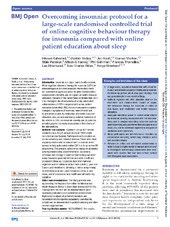| dc.contributor.author | Kallestad, Håvard | |
| dc.contributor.author | Vedaa, Øystein | |
| dc.contributor.author | Scott, Janine Linda | |
| dc.contributor.author | Morken, Gunnar | |
| dc.contributor.author | Pallesen, Ståle | |
| dc.contributor.author | Harvey, Allison G. | |
| dc.contributor.author | Gehrman, Phil | |
| dc.contributor.author | Thorndike, Frances | |
| dc.contributor.author | Ritterband, Lee | |
| dc.contributor.author | Stiles, Tore C | |
| dc.contributor.author | Sivertsen, Børge | |
| dc.date.accessioned | 2020-01-03T12:38:08Z | |
| dc.date.available | 2020-01-03T12:38:08Z | |
| dc.date.issued | 2018 | |
| dc.Published | Kallestad H, Vedaa Ø, Scott JL, Morken G, Pallesen S, Harvey AG, Gehrman, Thorndike, Ritterband, Stiles TC, Sivertsen BS. Overcoming insomnia: Protocol for a large-scale randomised controlled trial of online cognitive behaviour therapy for insomnia compared with online patient education about sleep. BMJ Open. 2018;8:e25152 | eng |
| dc.identifier.issn | 2044-6055 | |
| dc.identifier.uri | https://hdl.handle.net/1956/21251 | |
| dc.description.abstract | Introduction Insomnia is a major public health concern. While cognitive behaviour therapy for insomnia (CBT-I) is acknowledged as the best available intervention, there are unanswered questions about its wider dissemination, socioeconomic benefits and its impact on health resource utilisation. The aim of this randomised controlled trial (RCT) is to investigate the effectiveness of a fully automated online version of CBT-I compared with online patient education about sleep (PE). Outcome measures comprise changes in symptoms of insomnia, time off work due to sick leave as well as medication and health resource utilisation. Also, we will examine (i) putative mediators of the effects of CBT-I on insomnia severity and (ii) selected potential psycho-bio-social moderators of the effects of the interventions. Methods and analysis A parallel-group RCT will be conducted in a target sample of about 1500 adults recruited across Norway. Participants will complete an online screening and consent process. Those who meet eligibility criteria will be randomised to receive direct access to fully automated online CBT-I or to an online PE programme. The primary outcome is change in insomnia severity immediately postintervention; secondary outcomes are change in daytime functioning and other sleep measures postintervention and at 6-month and 24-month follow-up. Objective data from national registries will be obtained at two time points (1 year and 2 years post-treatment), allowing a mirror image study of preintervention and postintervention rates of sick leave, and of medication and healthcare utilisation by condition. Ethics and dissemination The study protocol was approved by the Regional Committee for Medical and Health Research Ethics in South East Norway (2015/134). Findings from the RCT will be disseminated in peer-reviewed publications and conference presentations. Exploratory analyses of potential mediators and moderators will be reported separately. User-friendly outputs will be disseminated to patient advocacy and other relevant organisations. | en_US |
| dc.language.iso | eng | eng |
| dc.publisher | BMJ | eng |
| dc.rights | Attribution CC BY-NC | eng |
| dc.rights.uri | http://creativecommons.org/licenses/by-nc/4.0/ | eng |
| dc.title | Overcoming insomnia: Protocol for a large-scale randomised controlled trial of online cognitive behaviour therapy for insomnia compared with online patient education about sleep | eng |
| dc.type | Peer reviewed | |
| dc.type | Journal article | |
| dc.date.updated | 2019-08-29T13:18:13Z | |
| dc.description.version | publishedVersion | |
| dc.rights.holder | Copyright 2018 The Author(s) | eng |
| dc.identifier.doi | https://doi.org/10.1136/bmjopen-2018-025152 | |
| dc.identifier.cristin | 1614207 | |
| dc.source.journal | BMJ Open | |
| dc.relation.project | Samarbeidsorganet mellom Helse Midt-Norge og NTNU: 90061500 | |
| dc.relation.project | Norges forskningsråd: 273623 | |

